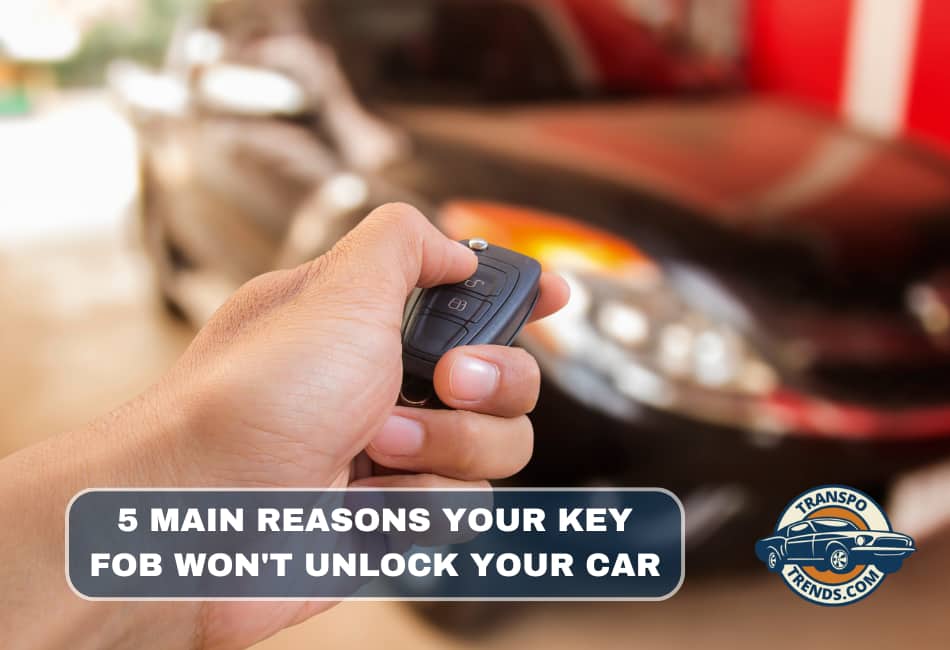Remote key fobs have become an essential part of modern vehicles, offering unparalleled convenience and enhanced security. With just the press of a button, you can unlock your car from a distance, making access swift and effortless.
However, like all technology, key fobs aren’t immune to malfunctions. When your key fob suddenly stops working, it can be frustrating, especially in urgent situations or unfamiliar settings. But there’s no need to panic. Most issues with key fobs are easy to diagnose and fix.
In this guide, we’ll delve into five of the most common reasons why your key fob may not unlock your car and offer solutions, whether you’re a DIY enthusiast or prefer to rely on professional help.
1. No Power
One of the most common reasons your key fob isn’t working is simply due to battery depletion. Remote key fobs rely on lithium batteries, which are similar to those used in watches and other small electronic devices. These batteries are efficient and widely available, but they don’t last forever.
Common Types of Lithium Batteries in Key Fobs
The two most frequently used lithium batteries for key fobs are the CR2025 and CR2032. These small, round batteries can be found in most electronics stores or online.
You’ll find the specific battery type inscribed on the current battery inside your fob, which will help you find the correct replacement.
Battery Life and Signs of Depletion
Typically, key fob batteries last between 3 to 4 years, depending on usage. As the battery begins to weaken, you may notice that the remote only works when you’re very close to your car, or you may need to press the buttons more firmly. These signs indicate it’s time to replace the battery.
Replacing the Battery
Replacing the battery is a simple, do-it-yourself task. Use a small flat-head screwdriver to pry open the key fob, remove the old battery, and insert the new one.
Make sure the new battery is the correct type, and ensure the positive side is facing up. Once replaced, snap the key fob back together, and it should be fully functional again.
2. Needs Reprogramming
Even when your key fob has a fully charged battery, it may still fail to unlock your car due to a loss of programming.
The key fob and the car’s receiver must be properly synchronized for the remote to function. When this connection, or “pairing,” is disrupted, the key fob won’t work as expected.
How Pairing Works
When you first purchase a car, the dealership pairs the key fob with the vehicle by putting the car’s receiver into a “programming mode” and completing a series of steps to establish the connection between the car and the fob.
This pairing process ensures that only your specific key fob can unlock and access your vehicle.
Common Causes of Pairing Corruption
Several issues can disrupt this pairing, such as:
- Low or Dead Batteries: A depleted battery can interfere with the connection between the fob and the vehicle.
- Physical Shocks: Drops or impacts can cause internal damage to the fob, leading to programming issues.
- Other Electronic Malfunctions: Occasionally, the system can experience glitches that cause the fob to lose synchronization with the car.
DIY Reprogramming
Most car manuals provide instructions on how to reset or reprogram your key fob. This process typically involves placing the car in a specific mode and pressing certain buttons on the fob to reestablish the connection.
By carefully following these steps, you can often restore the fob’s functionality without professional assistance.
3. Damaged Transmitter or Receiver
Sometimes, even with a charged battery and proper programming, your key fob might still not unlock your car due to damage in the transmitter or receiver.
The key fob and vehicle communicate through a signal exchange, where the key fob sends a unique code to the receiver in your car. When the code is recognized, the car unlocks or performs the requested action.
How the Transmitter and Receiver Work
Think of the key fob’s transmitter and the car’s receiver as partners in a handshake. The fob sends out a signal — a unique code — to the car’s receiver, and if the code matches, the car unlocks or opens the trunk.
However, if either the transmitter in the key fob or the receiver in the vehicle is damaged, this signal exchange can be disrupted.
Common Causes of Damage
Physical Damage: Dropping your key fob or exposing it to water can damage the internal transmitter, leading to communication issues with your car.
Wear and Tear: Over time, the internal components of both the fob and the receiver can degrade, affecting their ability to send or receive signals.
What to Do
If you suspect damage to the transmitter or receiver, the first step is to try resetting the system. Many vehicles include reset procedures in their manuals, which might restore the connection between the key fob and the car. If the reset doesn’t resolve the issue, it’s time to seek professional help.
An automotive locksmith or technician can diagnose the problem and either repair or replace the damaged components.
4. Damaged Components
Key fobs are built to endure everyday wear and tear, including occasional drops. The durable exterior is designed to protect the internal components from damage.
However, in cases of more severe impacts — like a significant drop or accident — the internal electronics can suffer damage, even if the outside looks unscathed.
How Internal Components Get Damaged
While the outer casing acts as a shock absorber, extreme trauma can disrupt the delicate circuit board or other internal parts.
This can render the key fob completely non-functional, even if it appears fine externally. Unfortunately, these internal components are difficult to repair, and in most cases, replacing the key fob is the most practical solution.
What to Do
If you suspect that your key fob’s internal components are damaged, it’s likely time to replace the entire fob. After obtaining a replacement, you will need to pair the new fob with your vehicle.
This process is straightforward, often outlined in your car’s manual. Alternatively, a dealership or an automotive locksmith can perform the pairing for you.
5. Intermittent Fault
Intermittent faults are some of the most frustrating key fob issues because they are unpredictable and inconsistent, making them difficult to diagnose.
One moment your key fob works perfectly, and the next, it stops responding without warning. These faults can leave you feeling like the issue has been resolved, only for it to return at the most inconvenient time.
Identifying Signs of Intermittent Faults
The first step in addressing this issue is recognizing it. Intermittent faults often manifest as sporadic unresponsiveness or inconsistent button functionality.
You may notice the key fob working flawlessly in one instance and then failing to perform at another time or location.
Check for Low Battery Issues
One of the most common causes of intermittent faults is a low battery. Before assuming a more serious issue, check the battery’s health.
A dying battery can mimic more significant problems and is often the simplest fix for sporadic malfunctions.
Investigating Interference or Faulty Transmitters
External interference, such as radio frequencies or other electronic devices, can also cause intermittent key fob problems.
Additionally, a faulty transmitter within the fob itself may lead to irregular communication with the car. It’s worth investigating any environmental factors that might disrupt the key fob’s signal.
Professional Help for Diagnosing Intermittent Faults
Due to the sporadic nature of these issues, pinpointing the exact cause can be tricky. Automotive locksmiths are often best equipped to diagnose and resolve intermittent faults.
If the issue persists despite addressing possible battery and interference causes, a professional can help identify and repair the underlying problem.
Additional Causes
While the five main reasons cover the most common key fob issues, there are a few additional causes that are worth considering. These can also contribute to your key fob’s failure and may require specific attention.
Battery
The battery is the lifeblood of your key fob. Regularly checking and replacing the battery can prevent unexpected malfunctions.
A dead key fob in the middle of a road trip taught me the importance of this simple maintenance task. Make it a habit to replace the battery every 1-2 years to avoid being caught off guard.
Buttons
Sometimes, the problem lies with the individual buttons rather than the entire fob. Over time, buttons can wear out from frequent use.
If your unlock button isn’t working but others are fine, it’s likely due to overuse or wear on that specific button. Replacing the button or the entire fob might be necessary.
Deprogramming
In rare cases, key fobs may require complete deprogramming and reprogramming to restore functionality.
This is typically a last resort when other troubleshooting methods have failed. While it’s not common, reprogramming the key fob can sometimes resolve stubborn issues.
Blockage
Physical obstructions inside the key fob can prevent it from functioning properly. Even something as small as a grain of sand can cause significant problems.
After dropping my key fob in the sand once, I learned how even minor blockages could disrupt its performance.
Disconnects
Internal wiring disconnects can leave your key fob completely unresponsive. When this happens, professional assistance is often needed to repair the internal circuitry.
I once encountered this issue and realized that fixing key fob wiring wasn’t as simple as it looked.
Wiring
Wiring issues are among the trickiest problems to deal with. Attempting to fix internal wiring yourself can make the problem worse.
I tried this once — and learned the hard way that it’s best to leave such repairs to the professionals. If you suspect a wiring problem, it’s always a good idea to consult an automotive expert.
Conclusion
In conclusion, a malfunctioning key fob can result from a variety of causes, ranging from a simple battery depletion to more complex issues like damaged components or wiring faults.
Each issue presents its own set of challenges, and while some can be resolved with basic troubleshooting, others may demand the expertise of a professional.
This guide has aimed to equip you with the knowledge to tackle common key fob problems, offering both DIY solutions and advice on when to seek professional help.
By understanding these potential causes, you can avoid the frustration of being locked out of your vehicle or stuck with a malfunctioning fob.
When in doubt, remember that automotive locksmiths are your best allies. With their expertise, even the trickiest key fob issues can be swiftly resolved.

